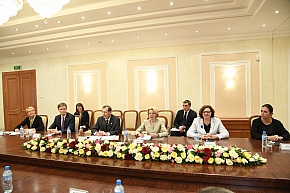 Gallery
Gallery
“Latvia welcomes comprehensive reforms implemented by the political leadership of Uzbekistan. Better investment and business climate, in particular, will create new opportunities for strengthening bilateral economic cooperation,” underlined Ināra Mūrniece, Speaker of the Saeima, on Tuesday, April 17, while meeting with high-level Uzbek officials in Tashkent.
Speaker Mūrniece met with Nigmatilla Yuldashev, Speaker of the Senate of the Oliy Majlis of the Republic of Uzbekistan, and praised the on-going political dialogue, including parliamentary exchanges, as well as diverse practical cooperation. Transport, ICT and other sectors of economy should cooperate more actively. Commodity trade is also essential. “We want to see more Latvian products in Uzbekistan, and more Uzbek fruit and vegetables on the shelves of shops in Latvia. That is why we are keen to help Uzbekistan get their agricultural products certified and ensure compliance with standards,” said the Speaker of the Saeima.
While meeting with Nuriddinjon Ismailov, Chairman of the Legislative Chamber, Speaker of the Saeima commended Uzbekistan for playing an active role in the Central Asian region through restored and strengthened cooperation with its neighbours. “Central Asia has immense economic potential, we should benefit from it more by strengthening our ties,” stressed Speaker Mūrniece, mentioning the Baltic cooperation as an example.
Ināra Mūrniece complimented the development of Uzbekistan’s tourism industry and offered to share Latvia’s experience. Tourism and trade rely on transport connections, which is why direct flights between Riga and Tashkent should be continued. Transport and transit cooperation should remain a future priority due to mutual benefits it has already generated.
Uzbek parliamentarians expressed interest in transferring Latvia’s health care and medical expertise. Speaker Mūrniece suggested that Public Health subcommittee of the Saeima Social and Employment Affairs committee, which is very active in the Latvian parliament, might be a good cooperation partner for Uzbek side.
Latvian and Uzbek parliamentarians agreed that education is an important area of bilateral cooperation. Uzbek youth belongs to the largest group of foreign students in Latvian universities. Uzbek parliamentarians also invited Latvian universities to open their branches in Uzbekistan.
Ināra Mūrniece emphasised the role of the European Union (EU) in the region. EU is an important trade partner and promoter of stability in Central Asia. Latvia is among those EU member states, which actively call for closer cooperation with Uzbekistan, and, inter alia, supports launching of negotiations on the EU-Uzbekistan enhanced partnership and cooperation agreement.
Speaker of the Saeima also met with Abdulla Aripov, Prime Minister of Uzbekistan, and welcomed the efficient political dialogue between the two countries. She also invited Shavkat Mirziyoyev, President of Uzbekistan, to visit Latvia. Ināra Mūrniece applauded the constructive efforts of the Latvia-Uzbekistan intergovernmental committee in fostering economic cooperation. Speaker suggested that the next committee meeting in Uzbekistan should focus on concrete results. She also urged Uzbekistan to sign the intergovernmental agreement on cooperation in education and science as soon as possible.
While meeting with Abdulaziz Kamilov, Uzbekistan’s Minister for Foreign Affairs, Speaker of the Saeima acknowledged the active role of Uzbekistan in promoting security and stability in Central Asia. Uzbekistan’s efforts in engaging Afghanistan in Central Asian cooperation are noteworthy. “Fight against terrorism requires a broader regional and international collaboration,” said the Speaker of the Saeima, underlining with pleasure that Latvia as a NATO focal point also complements Uzbekistan’s efforts. Latvia as a NATO focal point focuses on practical projects identified by the Uzbekistan. Latvia contributes to regional security and stability through EU border management programme in Central Asia (BOMCA), the largest EU assistance programme for Central Asia coordinated by Latvia. “We are happy that Uzbekistan welcomes the extension of this programme,” noted Mūrniece.
Foreign Affairs Minister Abdulaziz Kamilov underlined that Latvia, as a member of the EU, is a strategic partner of Uzbekistan, which provides a reassuring support. Afghanistan conference hosted by Uzbekistan in Tashkent at the end of March is a completely new initiative aimed at consolidating the region and facilitating greater involvement of Afghanistan in regional processes. Minister Kamilov also mentioned the current leap in Uzbekistan’s development. National currency reform has brought major transformation, and fight against corruption has intensified. As a result, Uzbekistan now hopes to attract more companies from Latvia.
Ināra Mūrniece underlined the importance of Latvia-Uzbekistan cooperation in the framework of the UN and urged Uzbekistan to support Latvia’s candidacy for the UN Security Council in 2025. Speaker of the Saeima also welcomed the adoption of the UN Resolution on Cooperation with the International Fund for Saving the Aral Sea on 12 April, emphasising that the signing of the resolution was supported by Latvia.
Ināra Mūrniece’s visit to Uzbekistan will continue until 19 April. Speaker of the Saeima is visiting Uzbekistan following the visit of Nigmatilla Yuldashev, Speaker of the Senate of the Oliy Majlis of the Republic of Uzbekistan, to Latvia last year. Delegation accompanying the Speaker of the Saeima includes Rihards Kols, Deputy Chair of the Saeima Foreign Affairs Committee, and Nellija Kleinberga, MP, member of the European Affairs Committee.
Photos: https://www.flickr.com/photos/saeima/albums/72157667853728048
Disclaimer & copyrights: https://www.saeima.lv/en/copyrights
Saeima Press Service









